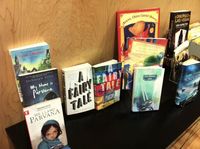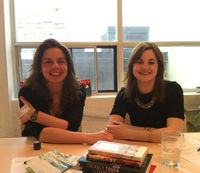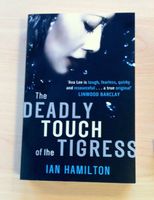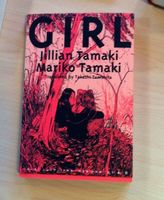Acknowledgements: Gillian Fizet & Jolise Beaton, Rights
By Evan Munday
Book publishing, as an industry, is not unlike a Jenga tower held together by sheer force of will. If the industry works at all, it's only because many dedicated and diligent people work or little reward like that horse, Boxer, from Animal Farm. (Though it's not all gloom-and-doom; it can certainly have its moments.) Many publishing workers remain invisible to readers and even authors, toiling away on initiatives and tasks unfamiliar to all but those already deeply enmeshed in the publishing world. 'Acknowledgements' is an interview series that aims to change that in some small way.
Rights sales are often viewed as the icing on the cake of a book's publication. But how good is a cake without icing, am I right? Who wants a pound cake for her birthday? Selling rights to a book means additional income for the author and publisher, and can also introduce an author's work to new audiences through foreign translations and editions, or even with adaptations into film or other media. Did you know there are sometimes staffers at publishing houses who dedicate all their time to this? These rights sales don't fall out of the sky. They're usually the culmination of months of hard work. And two of the hard-workingest people in rights management are Gillian Fizet and Jolise Beaton, Rights Manager and Assistant, respectively, at House of Anansi and Groundwood Books. Anansi is one of the most (if not the most) successful Canadian-owned publishers in selling rights to its titles around the world. Here, Fizet and Beaton talk about the nuts and bolts of the rights game.
Rights people are often a couple steps ahead of the others at a publishing house.
FIZET: 'We work ahead more than anyone else in the office aside from editorial, so that's why we know more about what's coming down the pipeline. Part of that is because we have to prepare for book fairs, so we do these catalogues – one for each company, one for Groundwood, one for Anansi – only one a year … and these are so early that you'll see … there's no cover here [displaying a page in the catalogue] … it's the first copy that gets put together. That's what I'm working from. I'm lucky if I get to read the book before. As it becomes available for me to read … as soon as the editorial people allow me to let it out into the world, I send it out to our scouts and publishers.
So, who are these scouts?
FIZET: They're incredibly important in this business, the scouts. They're based out of the U.K. and New York, for the majority. I will send them a pitch, say, 'This is what we have, and this is what it's about, and we're very excited because X, Y, and Z. And here's the manuscript.' From there, they will recommend books in their weekly reports to their clients and word starts to spread from there.
There are also rights subagents.
FIZET: In certain territories, we actually have people who are working for us – for our list – trying to spread the word of Anansi and Groundwood. So, for South Korea, you'll have a South Korean sub agent … and it's mainly due to language barriers. But also to – in certain areas – very, very concentrated publishing markets. Like, Germany. Germany … if I were to go out there alone, I'd be spending a lot of time because there are just so many publishers. It's such a rich literary culture.
The three R's of rights are research, research, and research.
FIZET: You have to keep track. Not only of the publishing houses' lists, but the editors' tastes. So, you might have a book where you're like, 'Do I send it to Bobby, Sally, or Jerry?' [Probably not actual editors' names.] You're curating a list. But you'll get help. People will hear about it. What often happens nowadays is when agents sell to us, they put an announcement in Publishers' Lunch, saying 'World Rights sold to Anansi' or 'World English,' and then I'll get emails the next day from people who want to see the book. So, a lot of it is research, and a lot of it is spreading the word, and a lot of it is reputation. That's the whole pitching process. Then, you put it out into the world and you wait.
Your CanLit News
Subscribe to Open Book’s newsletter to get local book events, literary content, writing tips, and more in your inbox
Like with Olympic athletes, working in rights involves a lot of training for a few big events.
BEATON: There are a few main fairs. For Anansi, it's London and Frankfurt. Also, Bologna for Groundwood. It starts, for London, the first week back in January. I'll go through the schedules from the previous year –
FIZET: The first week in January, building up to the second week of April. Frankfurt is even more lead time. It's June to October.
BEATON: We'll review the schedules from last year and the master list and chat with our colleagues and see who they want to meet with and put together a list and start contacting publishers. When you start sending out appointment requests, generally there's a time when there's just this influx of appointment requests you're receiving, but also, ones that you're sending out. We contact the scouts and they'll suggest appointments and sub-agents, and that gets a lot of the appointments out of the way for Barbara [Howson, VP of Sales for Anansi and Groundwood] and Gillian. Then, for Janie [Yoon, senior editor at Anansi], Sarah [MacLachlan, president and publisher at Anansi], and Sheila Barry [publisher of Groundwood Books] we'd would look at buying appointments. [That is, appointments for acquiring foreign books.] So they would meet with a lot of literary agents and rights people from other publishing companies.
FIZET: We are there primarily to sell rights; the editors and publishers help us sell, but they're also interested in a strong list of international acquisitions.
BEATON: You get an Excel spreadsheet and you're just trying to find – from 9 to 5:30 or 6 – appointments, times. Half an hour, fifteen minutes. Pre-fair. Post-fair drinks. Sometimes breakfast meetings. And in the lead-up to the fair, we've booked the stand months in advance. We also have to do the shipping. All the books that we're bringing to the fair. And then putting those invoices together and the shipments together and sending them to the fair. Then we've got the hotel bookings.
International book fairs can be gruelling. On your feet, alone.
BEATON: London is not really a problem, that's why I love London. Because you can get from appointment to appointment with no real running between. Whereas Frankfurt and Bologna both have many different halls –
FIZET: – which are probably the size of two American football fields.
[Not two Canadian football fields.]
BEATON: So in terms of scheduling, it's actually a big thing. They're over in Hall 25, but the next meeting you want to book is in Hall 29, and if it takes them 20 minutes to get between them …
FIZET: Sarah, Sheila, and Janie might be running around, but when Barb [Howson] and I are at book fairs, we sit all day long at our stand, and we have back-to-back meetings. I'm lucky if I get to go to the washroom. I'm lucky if I'm able to scarf a sandwich down.
BEATON: Gilly doesn't take a single break.
FIZET: I don't. I can't … people have lunch blocked off, but I'm not going to say 'no' to another appointment. If I'm lucky, there's a no-show. I've been doing this for six years and I've been going to fairs for about five, and, over time, you begin to know everyone. So, your meetings become … it's like meeting with old friends. You have your little formalities and pleasantries, and then you ask each other how business is going and what's working for you, and you just launch into your catalogue.
This is where that research comes in handy.
FIZET: We do notes before. For each appointment … I already know they said 'no' to this book, which is very similar to this new book. Or, they're late on a payment, or I haven't received a royalty statement, so I've made a note about that, which I'll bring up. [The fair meetings] give me a chance to have a one-on-one.
BEATON: We also list what they've acquired from us. It's all in the notes. And any outstanding things – say, they have a big author of ours. How are they doing with the Deborah Ellis or Marie-Louise Gay?
FIZET: And that takes a lot of time, putting those notes together. And, obviously, you have to wait until the last-minute, when you know the schedule's completely firmed up. But it's helpful. You need to be prepared for these things. You can't just expect people to show up and tell you what they want. Because they've been bombarded with blasts and catalogues. It helps for you to be able to pinpoint [poking table] – and I find that those are the best meetings. When I've already picked out what I think they should see. They're so grateful, too, because it gets annoying to be talked at all day. It's funny, because there's such a 'going-out' culture at these international book fairs. They stay up so late. But I'm speaking all day. I can't show up off my game. Which is really exhausting. But I think it's probably just as exhausting to be on the other end – sitting there, listening to people pitch to you all day long.
When the fair closes for the day, that doesn't mean the job is over.
BEATON: There's also the parties, and the dinners before – so, while I'm scheduling Gilly, Janie, Barb, Sheila, and Sarah from 9 to 5:30, then they're going for a drink and then they're going for dinner and then they're going for more drinks and then there are parties after. So, you're kind of juggling what they're going to do, giving them different options, printing them maps –
FIZET: Yeah, Jolise is amazing. She's a gem. Janie and I are horrible with directions – like, awful. Especially when we're together. So, those maps help. In this digital world, where we really could be using our phones. But that gets so expensive. [At the international fairs], there's so much word of mouth. In Frankfurt, we had Girl Runner by Carrie Snyder, which sold like wildfire, and it started right before the fair. During the fair, we were in auctions with several different countries. Which is huge. And that is, in large part, because we were there, on the ground, in this international setting, where we could meet with people. People would hear about it from each other. A French editor told a Spanish editor and so we had offers simultaneously. Because they had been at the same dinner and had heard about it from another editor who had just bought it.
Why focus on in-person meetings in todays' digital age?
FIZET: In this day and age of email and Skype, people question the ... utility of attending book fairs. But really, it does pay off. The funding that we get from places like the OMDC, Livres Canada Books, the ACP, is so key to that, because that allows us to go out to these foreign markets. Because without – when you're not able to go out to meet these people and establish these connections long-term, then … it's really hard. I was really lucky to go to Korea last year. I was representing Livres Canada Books, on a mission for English-language trade books. I was there to learn about the industry and report back to my colleagues at home on the state of the market and the best ways of getting our books into it. But following my official duties, Anansi and Groundwood paid for me to take two days to spend with our subagents. We have a subagent for Anansi and a different one for Groundwood. And I spent an afternoon in each of their offices just sitting there, and they brought in publishers from around the city [Seoul] to meet with me, and I pitched to them. Sometimes I didn't pitch, because they couldn't understand me, so our sub-agent would pitch. And even given that language barrier, that made a huge difference for me, just being there. Them seeing my face and making the connection and me being able to talk about our company, what we do. I came back and, on the Groundwood side, I had three offers in my inbox when I got back. And later, we went on to sell another two or three. With Anansi, maybe one or two deals.
There's even more follow-up after a fair than there is prep work beforehand.
FIZET: A huge, huge part of our work is the follow-up from the fair. And that takes forever. You come back from the fair and you're totally gung-ho to get it all done, but – today was going to be a day of follow-up for me … I got one email out. That's actually – sort of on a greater scale – very representative of the world of rights. You have no idea what's going to hit you on any day. You have to be prepared to drop everything on a given day because, a big offer just came in. Or a book that you weren't ready to submit – because you thought it would be a few more weeks – is suddenly ready and everybody's knocking at your door for it.
Rights sales are called gravy, but they sometimes become the potatoes … or pot roast. (Whatever you put gravy on.)
FIZET: A book isn't connecting with readers in our market could be a huge international winner. Just on foreign rights sales. Rights people joke about how it's sort of 'gravy' to the business. But since January, I have two books that have not hit publication yet, and just by rights sales – by selling rights in advance – the authors have earned out their initial advances. That means that when the book goes to the bookstores and the sales start coming in, they'll start earning royalties. Which is amazing. As soon as they sell a single book.
You never know what's going to be a hit in a foreign market.
FIZET: It's so cool to be able to position books that could be deemed as very Canadian to these unusual foreign markets. Barb was saying that – I hadn't heard this – but they recently replayed an interview with Alistair MacLeod on 'Here and Now' … or maybe it was 'As It Happens' … and a large part of the interview was about how thrilled he was that one of his books had been sold in Albania. That means that they read it. And that very localized Cape Breton story had resonated with somebody in Albania. That's so cool.
BEATON: Anne of Green Gables has a huge Japanese following, so there's something that resonates there. We just sold Lucky Dog: How Being a Veterinarian Saved My Life, the author's cancer story about how treating dogs and cats informed her experience, in Korea. And that was its first rights sale, too.
FIZET: Yeah. Totally out of the blue. And it has a lot to do with the Canadian health care system. But it seemed to resonate with Korea. There's always weird surprises.
As with many publishing jobs, employment is often the result of a happy accident.
BEATON: I interned at Bloomsbury in the U.K., but particularly, what got me into Anansi was interning at Luytens & Rubinstein, which is a literary agency. I was interning for them at the time of the London Book Fair. Sarah had met with them at the fair and I actually remember, I had to confirm the meeting and I had to email this woman, Gilly, at Anansi, and I remember thinking, 'Who IS this Gilly? I want to be her.' [Laughs.] 'How do I get there?'
FIZET: But there you go – there's one of those connections. Sarah's doing business with these literary agents and they have this great assistant.
BEATON: Sarah met with them at the book fair and they also have a book shop in Notting Hill. So it's a bookstore and literary agency. After the fair, Sarah came to the office, and I got really, really nervous. Because I felt like I was meeting Justin Bieber. But I was meeting Sarah. And they were like [affects a pitch-perfect British accent], 'Oh, Jolise. She's a huge fan of Anansi.' And Sarah was like, 'Really?' And she says, 'There aren't any jobs right now, but here's my card. Contact me when you're back.' So, I kept in touch with her. The day I flew back from the UK, I came here the next day for an interview for an internship.
Translation can be a difficult thing.
FIZET: For The Water Rat of Wanchai, the U.K. went with The Deadly Touch of the Tigress. Sexing it up a bit. There was a case with Alison Pick's book. Originally it was going to be called Thursday's Child, which is also a U.S. charity that helps abused and runaway children. And HarperCollins said, 'We can't use this title.' So then it became Far To Go. On the Groundwood side, we have the great book called Wanting Mor by Rukhsana Khan, and the Italians called it Cinderella of Kabul. Which is, essentially, a great title. Skim: in Japan, it's called Girl, because they just felt that 'skim' doesn't mean anything and they can't translate it. Another interesting thing is covers. What people do with their covers. So, they're making a big statement with this. [The Japanese cover of Girl depicts the teenaged protagonist and her teacher (spoiler alert) kissing.] We were quite shocked that this is what they would want. Another funny one is The Outlander. In German, the translation is – my mother's German and I ran this by her today – it's Out There in the Far Distance, the Dogs. My mom said, 'Y'know, that's a really beautiful title in German, actually.'
You never stop working in rights.
BEATON: We never stop selling a book, really. We recently – we did a deal in Turkey where we sold four of our Massey Lectures there. And some of them are really quite old. Like, Richard Lewontin. Does he know we're still working to sell Biology as Ideology (1990)?
But it has its high points.
FIZET: It's exciting, when you find a publisher who just falls in love with something that is so quirky or literary or whatever, but is just convinced there is a place for this book in their market. And it has nothing to do with the fact that there's a huge name attached or trends that are happening. And that, I think, is the most satisfying thing. Or when you get behind a book and you push so, so, so hard for it. And then it happens. But it didn't happen by itself. It happened because you were spending hours and months … so much of the work we do is at the front end. You put it out and just … you wait, and you remind people that they have that book, and you remind people whenever you get a new review of that book. You're constantly pushing. You're finding ways to bring that book back to their attention. Which is a hard … hard thing. But that's part of sales. You see it pay off.
BEATON: Sarah was asked to have her photo taken so that her photo can hang in the hall of Frankfurt. This relatively small Canadian publisher, she will be there. Among the president of Faber and other well known international publishing figures. So, I think that's a sort of small token of what Anansi and Groundwood mean on an international scale.
Originally published in Canada as The Water Rat of Wanchai by Ian Hamilton, The Deadly Touch of the Tigress is published in the United Kingdom by Sphere, an imprint of Little Brown Book Group. Originally published in Canada as Skim by Mariko Tamaki and illustrated by Jillian Tamaki, Girl is published in Japan by Sanctuary Publishing.
Stay tuned for more 'Acknowledgements' throughout May.
The views expressed in the Writer-in-Residence blogs are those held by the authors and do not necessarily reflect the views of Open Book: Toronto.
The views expressed in the Writer-in-Residence blogs are those held by the authors and do not necessarily reflect the views of Open Book.
Evan Munday is the author and illustrator of the acclaimed book series for young readers, The Dead Kid Detective Agency. Both The Dead Kid Detective Agencyand its sequel, Dial M for Morna, were nominated for the Silver Birch Fiction Award.
Evan has worked in book marketing and publicity for ten years, eight of which were as publicist at Coach House Books, and he has since worked as a freelance illustrator and ebook designer.
Find out more about Evan on his website, idontlikemundays.com or follow him on Twitter at @idontlikemunday.





